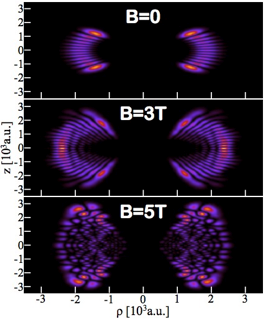
Strong Magnetic Fields & Antihydrogen Formation
When applied to a highly excited Rydberg atom, a magnetic field of a few Tesla has a drastic effect on its structure -- comparable to the response of groundstate atoms to enormously large fields of several 1000 Tesla, as realized in astrophysical objects such as white dwarfs. In the same way, low-temperature plasmas are much stronger affected by magnetic fields than their high-temperature counterparts.
Strongly magnetized Rydberg atoms and plasmas continue to attract interest for several reasons; they represent a well-known paradigm for quantum-chaos, exhibit interesting collective and collisional properties and may provide a superior route towards simultaneous atom-plasma confinement and control. From another perspective, understanding the physics of strongly magnetized Rydberg-plasmas is important for ongoing experiments that produce Antihydrogen atoms at CERN. Once created, ultracold groundstate antihydrogen will permit unique matter-anitmatter comparisons to test fundamental physics such as CPT symmetry or gravity.
We are developing tools to describe and understand the dynamical behavior of strongly magnetized Rydberg atoms and plasmas. Within combined classical and quantum approaches we are working on such questions as: What is the basic mechanism of atom formation in strong magnetic fields and how does is it depend on plasma parameters? What type of atoms are formed and how can we manipulate the resulting atomic state distribution? How do Rydberg atoms evolve in the fields of strong magnetic traps and how can we control their dynamics? Answering such questions is also relevant for current antihydrogen experiments and we are closely working together with experimental groups at CERN, in this respect.

Electronic wavefunktion of a highly excited Rydberg atom at different magnetic field strengths.
Collaborations:
- Hossein R. Sadeghpour (ITAMP, Harvard-Smitsonian Center for Astrophysics, Cambridge MA, USA)
- Gerald Gabrielse (Harvard University, Cambridge MA, USA)
- Yasunori Yamazaki (RIKEN, Saitama, Japan and University of Tokyo, Tokyo, Japan)